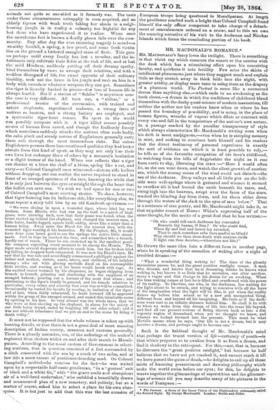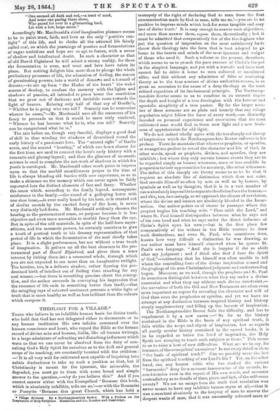MR. MACDONALD'S ROMANCE.*
Mn. MACDONALD'S fancy loves the twilight. There is something in that violet ray which connects the sunset or the sunrise with the dusk which has a stimulating effect upon his conceiving faculty, and quickens it into fertility. Few seize the skirts of intellectual phenomena just where they suggest much and explain little as they stretch away in thick folds into the night, with greater avidity, or display more taste in using them as the drapery
of a phantom world. The Portent is more like a connected dream than anything else,—which ends in an awakening as the book closes,—a dream in which the traditions of childhood blend themselves with the dusky quasi-science of modern mesmerism, till neither the author nor his readers know when or where he has passed the boundary of possibility, and is using, in the place of human figures, wreaths of vapour which dilate or contract with every rise and fall in the temperature of the author's own nature. In a passage marked by the peculiar transparency of style which always characterizes Mr. Macdonald's writing even when his drift is most amlaiguous,—even when he is steeping memory in mist, and seeking to convince both himself and his readers that the direct testimony of personal experience is exactly the sort of evidence on which it is least possible to rely,— he tells us of the favourite occupation of his hero's childhood, in watching from the bills of Argyleshire the night as it rose from earth to sky, liberating the stars :—" Here I would often lie, as the sun went down, and watch the silent growth of another sea, which the stormy ocean of the wind could not disturb—the sea of the darkness. Deep valleys and all little pits on the hill- side were well-springs where it gathered and whence it seemed to overflow till it had buried the earth beneath its mass, and, rising high into the heavens, swept over the faces of the stars, washed the blinding day from them, and let them shine down through the waters of the dark to the eyes of men below." That
is a sentence of true poetry, and Mr. Macdonald might take it, or that exquisite sonnet of Blanco White's expressing half of the same thought, for the motto of a great deal that he has written:—
"Oh who could tell such darkness lay concealed Beneath thy beams, 0 Sun ? Or who could find, When fly and leaf and insect lay revealed, That to such countless orbs thou mad'st us blind ? Why should we then shun death with anxious strife If light can thus deceive,—wherefore not life ?"
He throws the same idea into a different form in another page, when he is speaking of the sensation of waking after a night of troubled dreams:—
" What a wonderful thing waking is ! The time of the ghostly moonshine passes by, and the great positive sunlight comes. A man who dreams, and knows that he is dreaming, thinks he knows what waking is, but knows it so little that ho mistakes, one after another, many a vague and dim change in his dream for an awaking. When the true waking comes at last he is filled and overflowed with the power of its reality. So likewise, one who, in the darkness, lies waiting for the light about to be struck, and trying to conceive with all the force of his imagination what the light will be like, is yet when the reality flames up before him seized as by a new and unexpected thing, different from and beyond all his imagining. He feels as if the dark- ness were cast to an infinite distance behind him. So shall it be with us when we wake from this dream of life into the truer life beyond, and find all our present notions of Being thrown back as into a dim vapoury region of dreamland, when yet we thought we knew, and whence we looked forward into the present. This must be what Novalis means when he says, 'Our life is not a dream, but it may become a dream, and perhaps ought to become one.'" Such is the habitual thought of Mr. Macdonald's mind that perhaps the truest version of life—certainly of youth—is that which prepares us to awaken from it as from a dream, and find it shadowy in the retrospect. For this,—not, that is, because he distrusts the "great positive sunlight," but because he half
believes that we have not yet reached it, and cannot reach it till we have passed the gates of death,—he delights to call up all those mists of haunting presentiment and dawning philosophy which make the world swim before our eyes ; for this, he delights to weave together the glimmerings of superstition and the glimmer- ings of science till you may describe many of his pictures in the words of Tennyson :—
• The Portent. A Story of the Inner Vision of the Highlanders commonly cane& the Second Sight. By George Macdonald. London: Smith and Elder.
" One seemed all dark and red,—a tract of sand, And some one pacing there alone,
Who paced for ever in a glimmering land, Lit with a low, large moon."
Accordingly Mr. Macdonaldts chief imaginative pleasure seems to be to paint trust, faith, and love as the only "positive sun- light" of this life, and to clothe all the external life falsely called real, on which the yearnings of passion aud fermentations of vague ambitions and hope are so apt to fasten, with a sense of shadow and intellectual doubt. In such a character as that of old David Elginbrod he will admit a strong reality, for there the fermentation is over, and trust and love have taken its place. But nothing delights him more than to plunge the whole preliminary processes of life, the education of feeling, the season of germinating powers, into a world of dimness and a turmoil of dreams,—to stir up from "the Hades of the heart" the weird omens Of destiny, to confuse the memory with the lights and shadows of passion, all intended to press home the conviction that we grow out of darkness and invisible roots towards the light of heaven. Echoing only half of that cry of Goethe's, "Whither he is going who can tell ? Scarcely can he remember whence he came,"—Mr. Macdonald uses all the resources of his fancy to persuade us that it would be more truly rendered, "Whence he has become what he is, who can tell? Scarcely can he comprehend what he is."
The tale before us, though very fanciful, displays a good deal of skill in thus winding the shadows of dreamland round the early history of a passionate love. The "second sight" of Gaelic seers, and the second "hearing," of which one hears almost for the first time, are used to connect the hero's early history with a romantic and gloomy legend ; and then the glimmer of mesmeric science is used to complete the net-work of shadows in which his youth is enveloped. Mr. Macdonald takes much pains to impress upon us that the morbid sensitiveness proper to the time of life is always blending old fancies with new experience, so as to make a shimmer on the memory which can never again be fairly separated into the distinct elements of fact and fancy. Whether the omen which, according to the family legend, accompanies misfortune in the family,—the sound of a galloping horse with one shoe loose,—is ever really heard by his hero, or is created out of similar sounds by the excited fancy of the hour, is never very distinctly laid down. Mr. Macdonald evidently chooses the hearing as the preternatural sense, on purpose because it is less objective and even more amenable to morbid fancy than the eye. But in spite of the odd materials, in spite of the half-born super- stitions, and the mesmeric powers, he certainly contrives to give a touch of poetical truth to his dreamy representation of that period of life in which the fermentation of the soul chiefly takes place. It is a slight performance, but not without a true touch of imagination. It gathers up all the best elements in the pre-
ternatural part of David Elginbrod, and gives them a truer interest by linking them into a connected whole, through which
you are not expected to see more than an imaginative twilight. The heroine, too, is a delicate shadow, rather figuring the pre- destined birth of intellect out of feeling than standing for any real woman ;—but there is something genuine about the concep- tion, and the author succeeds in conveying his impression that the romance of life ends in something better than itself,—that the mingling rays of coloured sentiment generate a white light of truth that is more healthy as well as less brilliant than the colours which compose it.

































 Previous page
Previous page